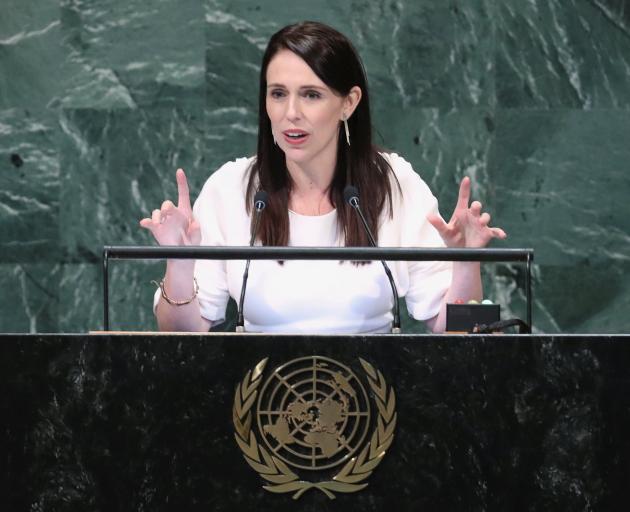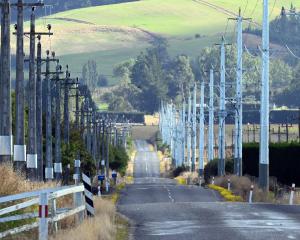
The speeches of President Donald Trump and New Zealand Prime Minister Jacinda Ardern in the UN General Assembly last week presented the profoundly different worldviews of a superpower and a small state.
Mr Trump said America rejected ''the ideology of globalism'' and embraced ''patriotism'', ''sovereignty'' and ''independence'' in order to make ''the world better''.
In contrast, Ms Ardern said challenges such as climate change were ''truly global in their nature and impact'' and that any undermining of multilateral efforts to deal with such problems would be ''catastrophic''.
Since the end of World War 2, New Zealand has been a firm supporter of what is known as the liberal international order.
The liberal international order can be defined as an open and rules-based system of international relations that is ''enshrined in institutions such as the United Nations and norms such as multilateralism''.
But structural changes such as the advent of globalisation - a term popularised in the early 1980s to describe revolutionary changes in information and communications technology - and the demise of the Cold War in the late 1980s has had profound consequences on the world in which we live.
In terms of inter-state relations, the US was left as the world's only superpower with no immediate geopolitical or ideological competitors in sight.
But US primacy has been somewhat diminished by a damaging and disproportionate response to 9/11, the global financial crisis of 2008-9, and the growing economic and military power of China.
Meanwhile, the traditional Westphalian conception of state sovereignty has been significantly qualified in several ways.
Developments such as the establishment of the WTO in 1995 and ICC extended international rules to the commercial and legal interactions of states.
At the same time, the post-Cold War era has witnessed the emergence of major non-state actors on the international stage.
These include multinational corporations such as Google and MacDonald's, advocacy groups such as Amnesty International and Greenpeace, and terrorist organisations such as al Qaeda and Islamic State.
It is in this context that an expanding liberal international order has faced serious opposition during the last decade from authoritarian states such as Russia and to a lesser degree, China.
Hybrid warfare - which employs a combination of military and non-military means to achieve traditional military goals such as territorial conquest - has been used by Russia in the Ukraine to redraw boundaries in Europe and by China in the South China Sea to create new artificial islands.
There has also been resistance to globalisation from nationalist-populist forces within the US and UK, two states that have traditionally championed the liberal order.
Britain voted narrowly in a June 2016 referendum to leave the community of liberal democracies that comprise the EU and four months later Donald Trump - a flamboyant economic and political nationalist - won the race to the White House.
Moreover, the liberal international order is facing what might be called an internal-external threat nexus.
There is growing evidence Putin's Russia colluded with the Brexit camp to influence the outcome of the UK's 2016 EU referendum.
Fake Twitter accounts were used to rally support for Brexit and questions are being raised about whether large sums of Russian money found its way into pro-leave campaigns.
Meanwhile, Special Counsel Robert Mueller's investigation into alleged Russian interference into the 2016 American presidential election has already generated a large number of indictments.
These assorted threats to the liberal order indicate New Zealand is now facing the most challenging global context since the end of the Cold War.
The Trump Administration seems to exemplify the view ''the strong rule where they can and the weak suffer what they must''.
Having abandoned multilateral agreements like the TPP, Paris Climate Accord and Iran nuclear deal, the Trump Administration has also threatened the WTO and ICC and launched damaging trade conflicts with China and the EU, both of whom are important economic partners of New Zealand.
It is not surprising, therefore, that Ms Ardern at the UN last week warned of the dangers of a return to the ''law of the jungle'' in the international arena.
Defending New Zealand's national interests not only means refusing to endorse Trump's hostile attacks against multilateral institutions and agreements, but also, as Ms Ardern indicated, reaching out to like-minded states.
However, this new level of international engagement by the Ardern-led Government must go beyond simply defending the international status quo.
The new focus for New Zealand and other democratic states must be on identifying elements of the liberal order that need to be strengthened.
Two sets of reforms should be pursued. First, the global security situation is not realistically going to improve until the P-5 group loses the privilege of being able to veto any Security Council resolution they do not like.
The brutal and disgraceful civil war in Syria is a sad reminder the UNSC is at present incapable of delivering either stability or justice to places that are in desperate need of both.
Second, it is time for New Zealand and other democratic states to seriously explore how the international economic system can be made to work better for more people.
The liberalisation of the global economy since the late 1980s has vastly increased trade and foreign investment but much of the new wealth created has remained in relatively few hands.
Without such reforms, the global order will remain vulnerable to forces of authoritarianism, populism and demagoguery.
Unilateralism or going it alone has repeatedly failed during the last three decades, and Ms Ardern's address at the UN General Assembly was a timely reminder that multilateral co-operation remains the most realistic strategy to address major environmental, economic and security problems, which simply do not respect national boundaries.
-Prof Robert G. Patman is a professor of international relations at the University of Otago.
Comments
The EU is happy to sign off the Nord Stream 2 pipeline from Russia that is severely damaging to the Ukrainian economy. The geopolitics is most likely that Russia wants to isolate the UK influence away from the EU so that it can exert more influence over the EU. Brexit will not lead to a Pro Russian Government in the UK.
Jacinda Ardern rose to power promising big cuts to immigration and stopping foreign property investment and so picking up the anti globalist vote in New Zealand. The same sort of undertones that led to Trump and Brexit. We have seen some very cautious criticism about Russia from the NZ Government so do we reach the same conclusion on that.











